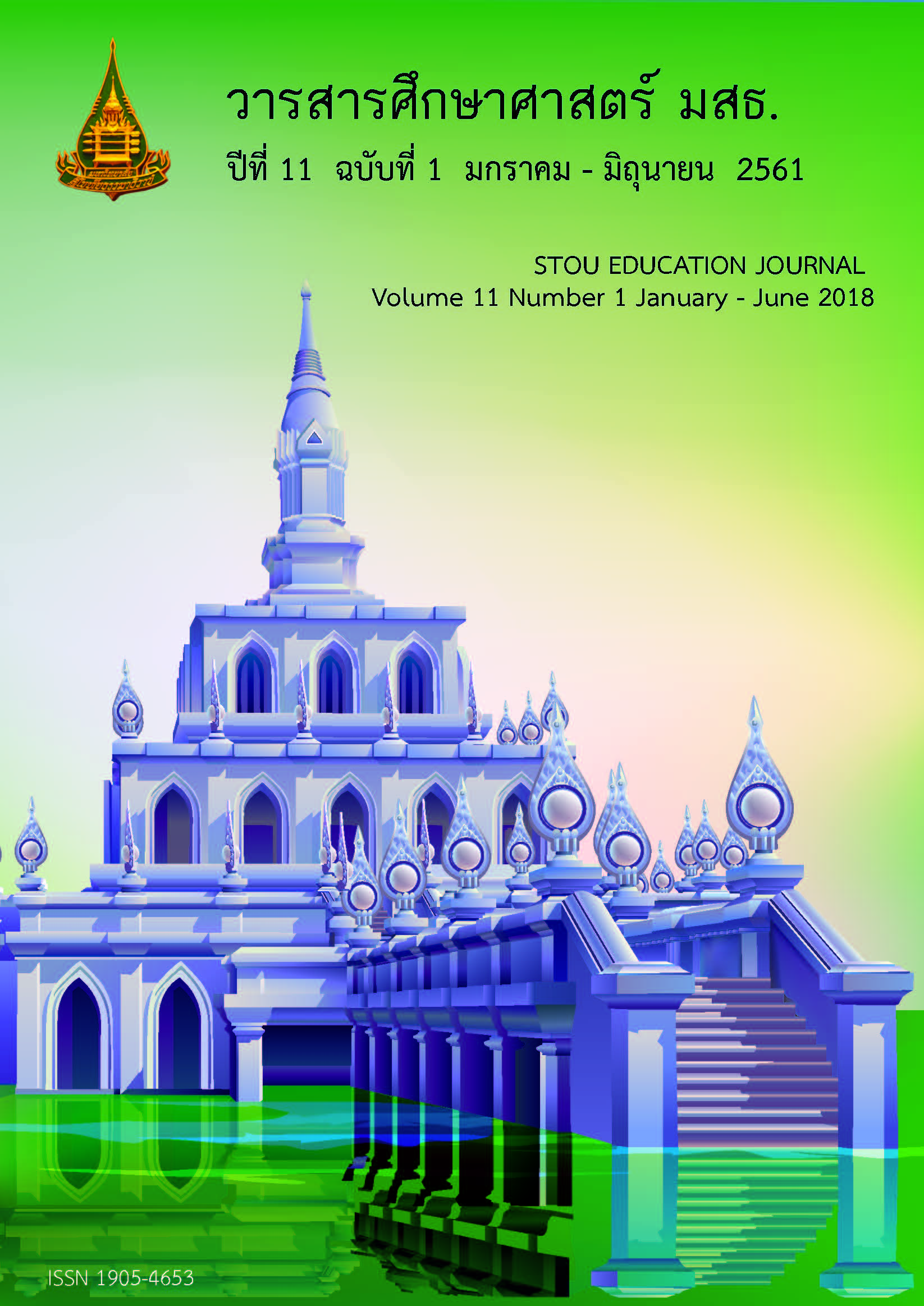การสังเคราะห์งานวิจัย วิชาเอกคณิตศาสตร์ แขนงหลักสูตรและการสอน ระดับบัณฑิตศึกษา มหาวิทยาลัยสุโขทัยธรรมาธิราช
Main Article Content
บทคัดย่อ
การวิจัยนี้มีวัตถุประสงค์เพื่อ 1) วิเคราะห์คุณลักษณะของงานวิจัยระดับบัณฑิตศึกษา วิชาเอกคณิตศาสตร์ แขนงวิชาหลักสูตรและการสอน สาขาวิชาศึกษาศาสตร์ มหาวิทยาลัยสุโขทัยธรรมาธิราช 2) สังเคราะห์งานวิจัยระดับบัณฑิตศึกษาวิชาเอกคณิตศาสตร์ แขนงวิชาหลักสูตรและการสอน และ 3) ศึกษาแนวโน้มของงานวิจัยระดับบัณฑิตศึกษา วิชาเอกคณิตศาสตร์ แขนงวิชาหลักสูตรและการสอน กลุ่มตัวอย่าง ประกอบด้วย วิทยานิพนธ์ และการศึกษาค้นคว้าอิสระ ระดับบัณฑิตศึกษา วิชาเอกคณิตศาสตร์ แขนงวิชาหลักสูตรและการสอน ที่จัดพิมพ์ ระหว่างปีการศึกษา 2536 ถึง 2557 จำนวน 159 เรื่อง เครื่องมือที่ใช้ คือแบบสังเคราะห์งานวิจัย 1 ฉบับ การวิเคราะห์ข้อมูล โดยใช้ ความถี่ ค่าร้อยละ
การวิเคราะห์ผลกระทบไขว้ และการวิเคราะห์เนื้อหา ผลการวิจัยมีดังต่อไปนี้ (1) คุณลักษณะของงาน จำแนกตามเนื้อหาสาระ/ประเด็นที่ศึกษา พบว่า เป็นวิทยานิพนธ์ 90 เล่ม และการศึกษาค้นคว้าอิสระ 69 เล่ม วัตถุประสงค์การวิจัยส่วนใหญ่ เป็นการศึกษาและเปรียบเทียบ รองลงมาเป็นการเปรียบเทียบอย่างเดียว งานวิจัยทั้งหมดเป็นงานวิจัยเชิงปริมาณ กำหนดสมมติฐาน 106 เล่ม ใช้แบบแผนการทดลอง แบบวัดก่อนและหลังการทดลองแบบกลุ่มเดียว 21 เล่ม ใช้วิธีการสุ่มตัวอย่างแบบกลุ่ม 114 เล่ม ส่วนใหญ่ศึกษาในระดับมัธยมศึกษาตอนต้น 99 เล่ม ใช้สื่อการสอน CAI 22 เล่ม เนื้อหาที่ศึกษา
กลุ่มใหญ่ที่สุดศึกษาเรื่อง เศษส่วน รองลงมาเป็นเรื่องสมการ ตัวแปรตามที่ศึกษา พบว่า กลุ่มใหญ่ที่สุดศึกษาผลสัมฤทธิ์ทางการเรียนอย่างเดียว รองลงมาศึกษาผลสัมฤทธิ์ทางการเรียนกับเจตคติ เครื่องมือวัดตัวแปรตาม ส่วนใหญ่เป็นแบบทดสอบวัดผลสัมฤทธิ์ทางการเรียน มีการหาค่าความเที่ยงด้วย KR-20 จำนวน 148 เล่ม (2) ผลการสังเคราะห์งานวิจัยทั้ง 159 เล่ม ด้วยการวิเคราะห์ผลกระทบไขว้ มีดังนี้ ปัจจัยเชิงสาเหตุคือระดับชั้นกับเนื้อหา พบว่า ส่วนใหญ่ศึกษากับนักเรียนชั้นมัธยมศึกษาตอนต้น โดยศึกษาเนื้อหาเศษส่วน 16 เล่ม สำหรับปัจจัยด้านตัวแปรต้นกับเนื้อหา พบว่า กลุ่มใหญ่ที่สุดใช้แบบจัดกิจกรรม 25 เล่มโดยใช้กับเนื้อหาการแก้โจทย์ปัญหา รองลงมาใช้ CAI โดยใช้กับเนื้อหา สมการ ฟังก์ชั่น และความน่าจะเป็น (3) แนวโน้มการวิจัยคณิตศาสตร์ศึกษา สาขาวิชาศึกษาศาสตร์ มหาวิทยาลัยสุโขทัยธรรมาธิราชในอนาคต พบว่า ควรทำการศึกษาเนื้อหาในอนาคต การเก็บข้อมูล ด้วยการผสมผสานข้อมูลเชิงคุณภาพที่เกิดขึ้นระหว่างการทดลอง เพื่อดูพัฒนาการของนักเรียน ส่วนตัวแปรตาม ควรศึกษาตัวแปรด้านทักษะกระบวนการทางคณิตศาสตร์ หรือทักษะของประชาชนในศตวรรษที่ 21 กับกระบวนการพัฒนาทักษะต่างๆ ของนักเรียน สำหรับนวัตกรรมการจัดการเรียนการสอน น่าจะใช้สื่อ mobile social media และon-line course และมีการศึกษาความรู้ของครูตามแนวคิดของบลูม ที่ปรับปรุงใหม่ ว่าครูมีความรู้ด้านความคิดรวบยอด กระบวนการ meta-cognitive ในเนื้อหาวิชาคณิตศาสตร์มากน้อยเพียงใด
เพื่อนำความรู้ด้านเนื้อหาดังกล่าวไปใช้ในการออกแบบการจัดการเรียนรู้ตรงตามวัตถุประสงค์ของหลักสูตรได้


